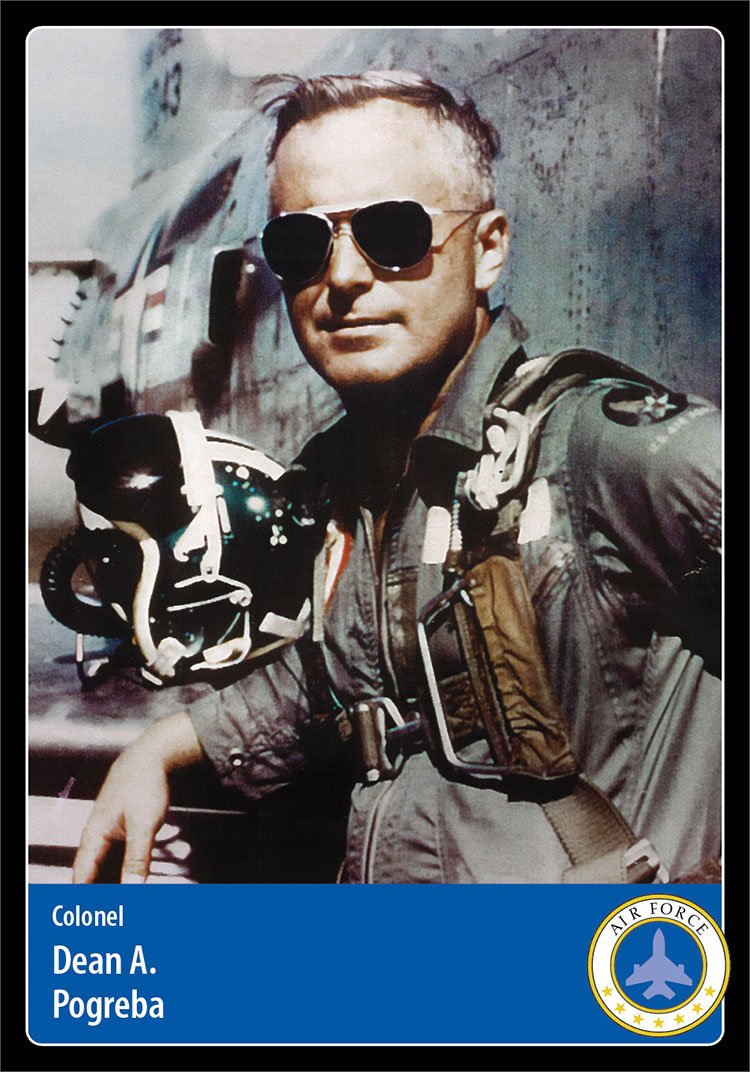Hero Card 235, Card Pack 20
Photo from the Vietnam Veterans Memorial Fund (digitally enhanced)
Hometown: Three Forks, MT
Branch: U.S. Air Force
Unit: 36th Tactical Fighter Squadron
Military Honors: Air Force Cross, Distinguished Flying Cross (2)
Date of Sacrifice: October 5, 1965 - KIA in North Vietnam
Age: 43
Conflict: Vietnam War, 1959-1975
As a young boy growing up in Three Forks, Montana, Dean Pogreba covered his schoolwork papers with drawings of fighter planes. Fulfilling his dream to fly, Pogreba became a highly decorated pilot who served in World War II (1939-1945), the Korean War (1950-1953), and the Vietnam War (1959-1975).
After graduating from Three Forks High School with the class of 1940, Pogreba joined the Army Air Forces and flew combat support missions during World War II. He was a “Hump Pilot”—a nickname given to Allied pilots who braved the treacherous supply route over the Himalayan foothills into China.
The route over The Hump and across Burmese jungles had to be crossed at enormous risk to resupply the Nationalist Chinese army. Pilots referred to the route as “the aluminum trail,” because they could plot their course by the long line of aircraft wrecks on the ground.
Dean Pogreba married Maxine Albro in 1944. The two would later welcome three children—Larry, Karin, and Beverly. As is common for career military pilots, Pogreba and his family moved often, living on military bases across the U.S. and Europe.
The Army Air Forces became a new independent branch of the military in 1947: The United States Air Force. With the breakout of the Korean War in 1950, Pogreba was called back to active duty. He flew more than 100 missions piloting the new F-86 Sabre fighter jet and shot down three Soviet MiG fighter jets.
He would earn two Distinguished Flying Cross medals for his actions in Korea. The first was awarded for his actions on May 10, 1953:
Captain Pogreba was leading his flight of F-86s escorting a group of fighter bombers that were striking the most heavily defended target in North Korea. Two minutes before reaching the target, approximately fifty enemy MiG-15s attacked the friendly aircraft. Captain Pogreba promptly engaged twenty-four of these enemy aircraft, luring them away from the much slower and very vulnerable fighter bombers.
Greatly outnumbered, Captain Pogreba utterly disregarded his personal safety by repeatedly engaging this overwhelming force, and exercised such superior skill, judgment, and courage, that he frequently gained the offensive over the MiGs.
Captain Pogreba continued his heroic action until the fighter bombers had completed their mission and withdrawn from the area. By his tenacious aerial ability and exceptional courage in the face of the enemy, Captain Pogreba insured the success of this vitally important and extremely dangerous mission. By his extraordinary heroism and devotion to duty, Captain Pogreba has brought great credit upon himself and the United States Air Force.
The actions earning his second Distinguished Flying Cross took place on June 24, 1953:
Pogreba was escorting a flight of friendly fighter bombers that were striking a vital target in North Korea when he sighted eight enemy MiG-15s preparing to attack the more vulnerable and much slower friendly aircraft. Captain Pogreba immediately initiated a firing attack that dispensed the bulk of the enemy aircraft. He then observed one of the MiGs diving toward the fighter bombers.
Though he had become separated from the rest of his flight, Captain Pogreba immediately went to the aid of the threatened friendly aircraft. With lethal accuracy Captain Pogreba struck his quarry with two deadly bursts of gunfire, and despite the enemy’s futile attempts to evade this withering assault, he tenaciously pressed his attack until the stricken enemy crashed in a ball of flame. By his skill, judgment and courage, Captain Pogreba insured the success of the friendly bombing mission and destroyed a MiG-15. By his extraordinary courage and devotion to duty, Captain Pogreba has brought great credit upon himself and the United States Air Force.
Capt. Pogreba would be promoted to the rank of Major and called into his third conflict with the escalation of the Vietnam War. At the age of 43, Pogreba flew an F-105D Thunderchief supersonic tactical fighter-bomber—nicknamed the “Thud” in the skies over North Veitnam.
On October 5, 1965, Maj. Pogreba’s extraordinary courage would again be on display. His final mission would earn him the Air Force Cross with a “V” device for valor—the second highest military decoration that may be awarded to a member of the United States Air Force. His citation reads:
The President of the United States of America, authorized by Title 10, Section 8742, United States Code, takes pride in presenting the Air Force Cross (Posthumously) to Lieutenant Colonel [then Major] Dean Andrew Pogreba (AFSN: 0-52644/AO-776026), United States Air Force, for extraordinary heroism in military operations against an opposing armed force as Pilot of an F-105D aircraft while serving on temporary duty with the 36th Tactical Fighter Squadron, Yokota Air Base, Japan, in action in Southeast Asia on 5 October 1965.
On that date, Lieutenant Colonel Pogreba participated as a pilot and mission coordinator for a strike against a highly significant military target. Despite the extreme difficulty of overcast cloud layers, haze, and rain showers, Lieutenant Colonel Pogreba flew at low level through mountain passes to the target area while encountering devastating automatic weapons and anti-aircraft artillery fire.
With complete disregard for his personal safety, Lieutenant Colonel Pogreba climbed to 9,000 feet into over-hanging clouds, which made him highly vulnerable to the hostile ground fire, and delivered his ordnance directly on the target. Lieutenant Colonel Pogreba then emerged from the clouds and though still subjected to intensive ground fire, assisted the other members of his flight in their weapons deliver, assuring complete destruction of this vital target.
His courageous actions and determination are in keeping with the highest traditions of the American fighting man under attack by an opposing armed force. Through his extraordinary heroism, superb airmanship, and aggressiveness, Major Pogreba reflected the highest credit upon himself and the United States Air Force.
After the successful mission, Pogreba never arrived at the rendezvous point and radio contact could not be reestablished. According to the Defense POW/MIA Accounting Agency, “Other pilots flying the mission reported last seeing Maj. Pogreba’s aircraft rolling off target amid heavy anti-aircraft fire, and that at least three surface-to-air missiles detonated at the time. Visual and electronic searches for Maj. Pogreba were unsuccessful, and enemy presence in the area precluded any ground searches. Further attempts to locate him were unsuccessful.”
Maj. Pogreba was declared Missing in Action, and his fate remained a mystery. According to the Bozeman Daily Chronicle:
Authors of the recently published book “Inside Hanoi's Secret Archives” found the first documented clue. They photographed Pogreba’s military ID and Geneva Convention card on display at the Hanoi Military War Museum. The card is in pristine condition, which proves Pogreba ejected from his plane and didn’t die in a fiery crash…He could have been killed by angry North Vietnamese villagers, a fate that befell some U.S. pilots. He could have been held captive and interrogated for his extensive knowledge of Western military procedures and equipment.
In Honolulu, Col. Dean A. Pogreba’s name is engraved on the American Battle Monument Commission’s “Courts of the Missing,” along with the others who were missing from the Vietnam War. He is honored at the Vietnam Veterans Memorial in Washington D.C., where his name is inscribed on Panel 2E, Line 109.
Col. Pogreba’s wife Maxine authored a book: POGIE 105 Missing In Action: Vietnam MIA Colonel Dean Pogreba.
On August 10, 1996, Pogreba Field was dedicated in his honor at Three Forks (Montana) Airport, where he first fell in love with aviation.
Sources
Defense POW/MIA Accounting Agency: Col Dean Andrew Pogreba
Bozeman Daily Chronicle, August 8, 1996: Airport monument to be dedicated to fallen flyer
Military Times—The Hall of Valor: Dean Andrew Pogreba
POW Network: Pogreba, Dean Andrew
Library of Congress: Status Review in the Case of Colonel Dean A Pogreba
POGIE 105 Missing In Action: Vietnam MIA Colonel Dean Pogreba
Together We Served: Pogreba, Dean Andrew, Col
Vietnam Veterans Memorial Fund—The Wall of Faces: Dean Andrew Pogreba
Burial Site: Find a Grave





